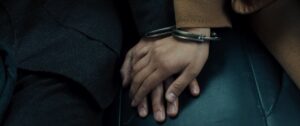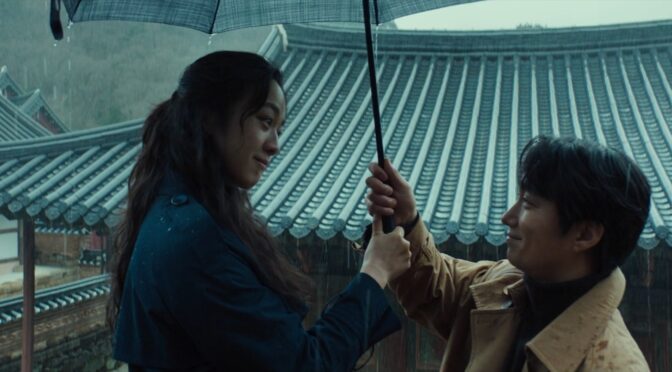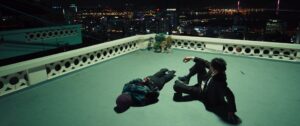Rumors of the visual motif’s demise have been greatly exaggerated. If 2022 is anything to go off of, we can hopefully expect to see the explosive resurgence of symbolic visual patterns that bring added meaning to a film’s themes and just give directors more fun imagery to play with. It may be rare that a motif absolutely makes a film but, like extra containers of parmesan and red pepper with your pizza, who would ever claim a film is better off without them? The past year gave us a couple of great visual motifs, both of which made use of elemental imagery. In S.S. Rajamouli’s game-changing RRR, the exciting Indian director used the contrasting elements of fire and water to represent two characters’ opposition and testy bond and, of course, to produce some absolutely astounding cinematic imagery. The year’s other great elemental motif came from South Korean gonzo maestro Park Chan-wook’s Decision To Leave. The Handmaiden director’s latest stylistically audacious, overwhelmingly romantic extravaganza’s spellbinding denouement features a dazzling and suspenseful motif of earth and water that does everything a visual motif should do. It speaks to the film’s themes. It burrows into the frenzied, lovelorn psyches of its leads. And it gives Park Chan-wook a way of ending on a profoundly unshakable crescendo of pure visual splendor. A poorly thought-out motif can occasionally feel amateurish or like its compensating for a lack of theme (okay, I promise to go a full ten reviews without critiquing The Revenant again), but great motifs take theme and harmonize over it in ineffably stirring ways. They make ideas more cinematic and some would say that is the most important thing a film can do. In the case of Decision To Leave, a film I found not simplistic but ideologically stripped down, the use of a diverse array of visual, elemental signifiers is part of what truly makes the film vibrate on its own singularly powerful wavelength. They should have sent an opera lover to write this review. It’s not that I don’t think Decision To Leave is a gorgeous, juicy piece of writing. It really is. But it’s a film that hits emotional highs and lows that are much better felt and seen than carefully corralled into words. Park Chan-wook’s latest disorienting feast is a deliriously rapturous and pained ode to the kind of love and obsession that turns us into sub-verbal animal versions of ourselves. Its terrific literate murder mystery is really just setting the table for a baser, more elemental mystery about human emotion. It’s a detective story about feelings so deep within our guts that words can’t even hope to reach them.
Jang Hae-Jun (played with pitch-perfect emotion and wry understatement by Park Hae-il), a police detective working in the Korean city of Busan, hardly ever sleeps. It’s a problem that neither his flabbergasted younger precinct partner nor the health-crazed wife he sees only once a week (their home is far away from Busan, in the fog-shrouded city of Ipo) can do anything to solve. The only thing he seems able to get any comfort out of is investigating homicides. One night a man’s battered body is found at the base of a very tall and craggy mountain. We see how dedicated Hae-Jun is to his detective work when he straps his skittish partner to his back and rappels up the mountain’s sheer face, rather than hiking the easy route or waiting for a transport chopper. “This is the path the dead man took. And we’re the police,” he dryly explains to his flustered co-worker. The dead hiker turns out to be a wealthy government higher-up with a well-documented passion for climbing. Hae-Jun and his partner are in the midst of a much higher priority murder case involving a band of infamous gangsters when this apparent accident or suicide falls on their desks. Hae-Jun seems bound to work it with the same weary, mild-mannered professionalism he brings to all his police work. That is, right up until the hiker’s beautiful Chinese immigrant wife, Song Seo-rae (Long Day’s Journey Into Night‘s Tang Wei, whose astonishing presence takes Chan-wook’s funky murder mood piece into the stratosphere) waltzes into the station for questioning. At that moment, something in Hae-Jun quakes and crumbles, subtly but visibly. He is protective of her right from the start. His demeanor toward her is gentle and careful. He commands his young right hand to make the entire investigation process easy on her. It’s partly that he naturally knows a lot about her already, just from the prying nature of detective work. He knows her life has not been easy. The deceased bigwig used to beat her hard. He even branded her with a tattoo of his own initials. The seemingly frail Chinese wife had clearly been brought over to South Korea into a relationship of coercion. Her demure submission to his possessive whims were likely part of the bargain for escape to a new country and a better life. Hae-Jun’s partner is more suspicious of Song Seo-rae. A little digging reveals she left China with a cloud of criminal suspicion trailing behind her; a sick mother she killed with a fatal dose of pain medication. She would be instantly arrested if she were ever to return. Song Seo-rae had been a nurse and now she uses her training and expert bedside manner to excel as a caretaker for the elderly. Some of this intel is found in police files. Some of it Hae-Jun learns from spying on her. We know that stakeouts are his forte, but he seems to particularly relish lookin in on this new suspect. When he brings her back in to the station for interrogation he gets them both fancy sushi to eat together in the holding room. He gets his first real night of sleep in ages while sitting in his car just outside of her Seoul apartment. And she develops a steady fondness for him as well; for the soft-spoken, good-hearted detective. Even though he is investigating her for possibly murdering her husband, she thinks of him as her detective. And the rest of this plot I’ll avoid divulging in too much detail. How its path winds and rises and drops is what makes Decision To Leave one of 2022’s true gems. It is about how a pulp detective mystery and a gorgeously smoldering taboo romance intertwine and complicate one another.
To quote contemporary country star Kacey Musgraves, I’m in love with a slow burn. And, at least for its first half, a slow burn is exactly what Decision To Leave appears to be. But anyone familiar with Park Chan-wook’s spontaneous and incendiary style knows that the flame of this story can not stay slow, low and measured for very long. Left for long enough, slow burns turn into conflagrations. Matters of the heart have a way of building into roaring blazes. What Decision To Leave knows is that a safe, controlled burn is rather antithetical to a crackling romance. Certainly a romance in the kind of steamy, emotionally roiling, Hitchcockian register Chan-wook so deftly occupies. This is the flashy master chef behind Oldboy and The Handmaiden after all. He won’t skimp on the sincere heart but he also won’t skimp on the heat or the emotional pyrotechnics. You are in the presence of a filmmaker who loves it when situations turn explosive and unpredictable. He cannot and will not promise you that the kitchen you’re watching him cook in won’t erupt into flames. That is the essence of his filmmaking and it is maybe the key idea at the center of Decision To Leave. It is a theme as simple as it is timelessly elemental: love, like fire, will not be tamed or contained. And when the full flush of love hits two characters in a story this dynamic, tonally eclectic and unhinged, there is no telling what that force will do to them. The fire of Hae-Jun and Song Seo-rae’s love takes its own course. It rattles Hae-Jun’s convictions as a dedicated police officer. It throws Song Seo-rae’s cagey survival instincts into disarray. If you think you are watching a slow burn, Park Chan-wook says to just wait and watch. The blaze isn’t done telling its story yet. One motif Decision To Leave establishes early is the idea of seeing things clearly: landscapes, evidence, people. Hae-June prides himself on his own objectivity and clarity. He applies eyedrops at crime scenes just to make sure his vision is topnotch. He makes his living as an expert in the art of reading people and peeking behind their facades; into the open windows of the truth. But love, Chan-wook posits, may make clarity an impossibility. Hae-Jun, ever the pragmatist, tries to fight off ambiguity and confusion wherever it meets him. He doggedly attempts to circumvent his and Song Seo-rae’s language barrier by using pictures to communicate to her what words cannot. But images can deceive or invite misreading just as surely as words can. Humans are fallible easy marks for their own desires and biases. Try as we might, in love and in all other matters of perception, human emotions throw up a thick blanket of fog. Smoke gets in your eyes.
What really gives Decision To Leave its personality, in a way that words like “idiosyncratic noir romance” can’t fully convey, is Chan-wook’s trademark sense of eclecticism. Even if it were nothing more than a stylish spin on the old detective noir formula (and, to be clear, its flowery writing and richly observed characters make it a great deal more than that), the film would be impossible to write off because of how free-wheelingly singular its tone is. It’s tragic. It’s swooningly romantic. It’s visually audacious and cleverly edited. It’s both majestically meditative and dizzyingly kinetic. It’s empathetic and powerful. It’s also every possible shade of funny: dry, outlandish, physical, satirical, sardonic and absurd. The best word I can think to use for something this deliciously resistant to pigeon-holing is “rich”. It is a proud representative of a year of strange, wooly masterpieces; films that did not feel pressured to behave themselves or stick to a lane. It was a banner year for boldly idiosyncratic visions and I can think of no director more qualified to hoist 2022’s freak flag than Park Chan-wook. On a second viewing, a very favorable comparison came to mind. I thought of Mark Frost and David Lynch’s seminal television masterpiece Twin Peaks. It shares that sense of scope coupled with an almost silly go-for-broke spirit. How often does a voluptuously rich tragedy also get to be consistently funny and proudly weird? How often does a soul-stirring romance also make room for a beleaguered police detective howling in pain while an aphrodisiac turtle dangles from his finger? Most detective stories don’t end a foot chase by having the cop exchange romance advise with the criminal. You can call Decision To Leave Hitchcockian and be basically correct but we should also acknowledge that the Master of Suspense never conceived of a man fending off a knife-wielding assailant with a shiny chain mail glove. Decision To Leave is what happens to a Hitchcock film when you leave it alone in a holding cell for two hours with Park Chan-wook.
The film takes a classic pulp noir template (the detective falls for the enigmatic women in distress with opaque motives) and dresses it up to the nines. While it might be thematically straightforward, it provides so much exhilarating technique and creativity that it becomes undeniably involving. Giving a sultry romantic tragedy a dash of maniacal whirligig glee is no mean feat. Park Chan-wook does not miss a single opportunity to make this story thrum with energetic wizardry and he is matched beat for beat by Ji-yong Kim’s gorgeous and pyrotechnically inventive cinematography. Decision To Leave is a thing of breathless maximalism. It flexes its auteur muscles like a bodybuilder. The most direction isn’t always (or even necessarily often) the best direction. Damian Chazelle’s relentlessly dorky Babylon is a recent reminder of that. But Decision To Leave is the kind of film where the direction calling attention to itself (and boy does it!) is a positive thing. In case a brilliantly acted, insightful, and moody meditation on the nature of love, obsession and dependency feels old hat to you, Park Chan-wook wants to assure you that you’ve never seen it quite like this. When I chose to include Decision To Leave among the twenty best films of 2022, my one question what what it all added up to. Had this all just been audacious beauty? What I was pleased to find on a rewatch is that the film’s symphonic emotional scope gives it all the thematic heft it needs. It’s an absolutely incendiary tour de force on the part of Park Chan-wook, but its playful, passionately potent screenplay and its two sensual and devastatingly layered performances give it depth and substance. There are plenty of stakes to go along with its sizzle.
One of the recurring devices in Decision To Leave involves Song Seo-rae’s imprecise grasp of Korean. Hae-jun will occasionally have to explain what a word means and the only way for him to do it will be to essentially unpack it for her. He will break term into its component parts. When he talks about a case that was unresolved, he clarifies that “unresolved” means that they didn’t catch the criminal It’s a definition that both works and yet does not really cover all that the word “unresolved” can mean. This idea of dissecting a word in ways that both tease out its meaning and leave some part of its essence, well, unresolved feels very fitting for what Park Chan-wook is up to with his Frankenstein noir romance. There’s a reason Hae-jun so often prefers images to words. Words are clumsy, reductive things. And so, Park Chan-wook seems to be saying, are genres. The characters in this film seem to have some sneaking suspicion that they could be in a noir movie and they are none too pleased by that prospect. With good reason. Noir films are wonderful things to watch but it’s the last kind of story you’d want to find yourself in. Chan-wook himself has insisted that Decision To Leave is not a noir movie and I believe that he means that, though I can’t say that I agree with him there (this critic roundly resists authorial intent). If i might speculate for a moment, I think there might be two reasons for his position. One, it may be the esoteric auteur defending the wild vision he has created. After all, one doesn’t create something so bold and liberated and bizarrely self-possessed just to see it filed away in the same cabinet as every other fatalistic story about a mysterious dame and the mild-mannered schmuck who falls for her. I think Chan-wook is also taking up his characters’ mantle in a very empathetic way. Sticking up for them. Song Seo-rae is a human being who wants to live and love. She doesn’t want to be some pawn on a beautiful noir chessboard, even if that is technically exactly what she is on. When a second murder is connected to Song Seo-rae, Hae-jun reaches the apex of his suspicion about her. Love be damned, he can never entirely shut off the detective in himself. Even if he might be infinitely happier without it, he cannot rid himself of the instinct to observe and process everything. He asks how she would feel in his shoes and tells her most people would look askance at two murders, tied to the same woman and in two different precincts each worked by the same detective. “Wow. What a coincidence,” is what they’d say. She softly and sadly answers back that the response to one woman losing two husbands to murder should be, “Wow. What a poor woman.” She is fighting tooth and nail to escape the noir lens and the sexist judgments that come with it. Song Seo-rae and Hae-jun recognize the path they are on and wish they could veer away from it. They want to be in each other’s arms where they can feel peace, not in some god-forsaken noir where things rarely ever end well. It is that soulful self-awareness that lends Decision To Leave’s characters a rich sense of agency and gives the film an ocean of depth that extends fathoms below its glistening surface.














